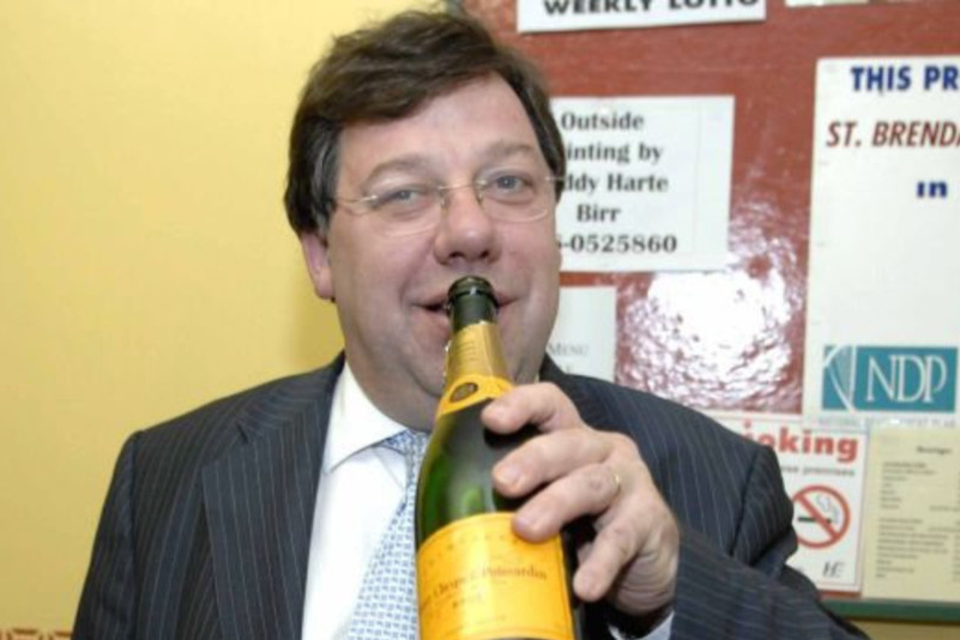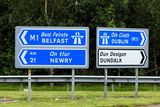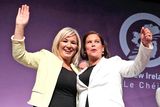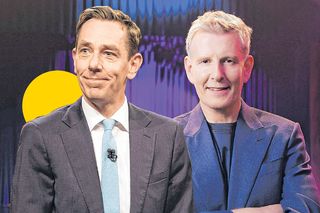Cowen blames Twitter for drink row
Former Taoiseach says tweet put his socialising in the spotlight, hastening the end of his career
Cheers: Brian Cowen celebrates with champagne after winning his seat in the Offaly/Laois election count in May 2007. Photo: JAMES FLYNN/APX
Former Taoiseach Brian Cowen has blamed Twitter for the uproar that followed his early morning 'session' and later dismal appearance on Morning Ireland during the Fianna Fail think-in that hastened the end of his political career.
Fifteen minutes after the radio programme ended, Simon Coveney, the current Housing Minister, tweeted: "God that was an uninspiring interview by Taoiseach this morning. He sounded half-way between drunk and hungover and totally disinterested."
"It (the Morning Ireland interview) sounds clogged up when you listen to it," Cowen told the authors of a new book reflecting on that turbulent episode. "I do have that sleep apnoea problem, but anyway that doesn't matter. Because it is not the reason why it all happened, it happened because of Twitter. If there was no Twitter there wouldn't have been a word about it," he said, insisting: "I wasn't jarred."
What the Coveney tweet did was to unlock the story of the drinking culture at the heart of Leinster House known as 'The Bar Lobby' - many of whom were close to the then Taoiseach.
"I don't think any journalist in all the time observing me, and I'm 27 years around the place [Leinster House], said I performed a public duty when I wasn't able to perform a public duty. I never mixed that," Brian Cowen says in a new book Hell at the Gates.
Cowen's view of life when he became Taoiseach was that he could remain the same character he had been as a TD and a minister and socialise in the same way, mostly with a male group of close friends from Fianna Fail.
But the optics of being "an enthusiastic socialiser" as described by the authors, journalists Daniel McConnell and John Lee, led to a growing lack of public and political confidence in that government.
"It's all about perception," he told the authors in an interview. "I was trying to be authentic, being myself... doing my job but being myself, trying to be authentic with people."
He says his family were "very resilient" about the constant media and political pressure of the time. "Of course it was challenging. They may have gotten a bit, a little bit [of verbal abuse] but nothing they couldn't handle. They have to stand up for themselves,."
His view remains that he was singled out because of his insistence that he was going to remain true to himself, even as Taoiseach. "If I have a long day or a hard day I relax by talking about other things," he says. "I sit down and have a couple of pints with a couple of people. I mean Bert [Ahern]would have done that and there wasn't anything about it, but Brian Cowen was having a drink - then suddenly it became a big issue."
However, he did concede that he did not handle the financial crisis well, or communicate the severity of it to the public. "I suppose crisis management is being out ahead of the issue and trying to put a context on it for people so that they can understand what is actually happening," says Cowen. "I didn't succeed in that. That much is obvious. I mean I didn't succeed. Sometimes you can be hard on yourself, but I didn't succeed on that front."
He also admitted that the government had a plan, but he wouldn't give a State of the Nation address because he didn't want to give false hopes to people.
The book, which examines the relationship between Cowen and his minister for finance Brian Lenihan, claims Lenihan undermined Cowen and wanted to topple him.
Lenihan told leading Fianna Fail dissident John McGuinness, who had been demoted from his ministry (junior) by Cowen, that if he did take over Fianna Fail he would form a national government. " Another former minister in that government, Willie O'Dea, was fascinated by the deteriorating relationship between the two men.
"Lenihan came in as his proposed right-hand man. As things got worse and the media continued to speculate about a change of leadership and focus on Lenihan that caused tension, tension that was fairly obvious," he says.
Join the Irish Independent WhatsApp channel
Stay up to date with all the latest news















